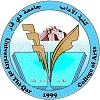Sociology
Building an efficient developmental educational system that seeks to develop capable and diverse national capacities capable of competition, possessing the keys to progress in all cultural and knowledge fields, achieving the goals of higher education in the humanities, and at the same time, working on updating its curricula and programs to keep pace with local and international manifested variables. It aims to contribute to providing plans and programs for policy-makers and decision-makers to achieve the goals of social policies in Iraq, as a methodological tool for bringing about structural and functional changes in state institutions and a scientific reference for civil society organizations.
Mission:
Enabling students to comprehend scientific material with its contemporary content that responds to the important transformations witnessed by Iraqi society. This is because the message of sociological curricula should be an infrastructure for developmental plans and programs, monitoring their implementation and evaluating their results in light of global developments.
Objectives:
First: Studying sociology (sociology, anthropology, and social work) with a critical developmental perspective and making necessary improvements and modifications.
Second: Defining the vision, mission, objectives, and outcomes of the scientific departments of sociology, and identifying the entities and institutions that benefit from these outcomes by linking the process of preparing graduates and their specializations with the developments needed by society, the job market, the actual cognitive development requirements, and keeping pace with scientific progress.
Third: Developing curricula in a comprehensive manner and according to specializations, in order to achieve:
Enhancing the quality of general higher education in accordance with the goals and objectives of the Higher Education Strategic Plan 2012-2022, keeping pace with global developments in the field of knowledge, in addition to enhancing educational and instructional aspects.
Achieving harmony and consistency in the orientations, paths, and visions of developmental curricula in sociology, providing an important standard for evaluating their outcomes in light of their proximity or deviation from the developmental paths that are in line with future visions.
Building national cognitive and skill capacities to ensure the enhancement of their active participation in the developmental interaction system.
Enhancing the alignment between the outputs of the educational process and the requirements of the job market.
Striving to develop sociology in a way that makes it a popular culture and a methodological tool for the development and empowerment of state institutions and civil society.
[/vc_wp_text]
Email
[/tp_tabs]

